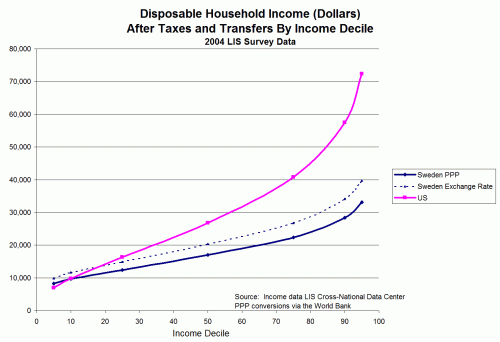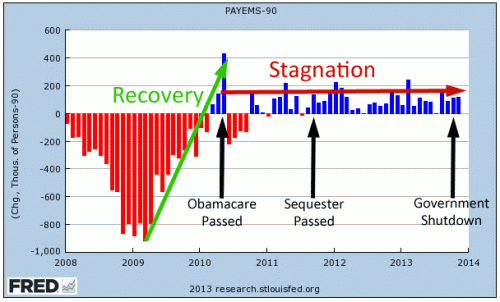Oddly enough, this is perhaps the most frequent argument I have with people on the Left in cocktail party conversations.
It begins this way -- some abuse of "private enterprise" is cited. Almost every time, I have to point out that the abuse in question could not occur if private companies were not availing themselves of government's coercive power to [fill in the blank: step on competitors, limit choice, keep prices high, rake in subsidies, etc.] Michael Moore's Capitalism: A Love Story is very much in this mold, blaming bad outcomes that result in government interventions on free market capitalism.
Kevin Drum has a great example of this. Asthma inhalers are expensive because certain companies used the government to ban less expensive competitive products.
Nick Baumann picks up the story from there:
The pharma consortium transformed from primarily an R&D outfit searching for substitutes for CFC-based inhalers into a lobbying group intent on eliminating the old inhalers. It set up shop in the K Street offices of Drinker Biddle, a major DC law firm. Between 2005 and 2010, it spent $520,000 on lobbying. (It probably spent even more; as a trade group, it's not required to disclose all of its advocacy spending.) Meanwhile, IPAC lobbied for other countries to enact similar bans, arguing that CFC-based inhalers should be eliminated for environmental reasons and replaced with the new, HFC-based inhalers.
The lobbying paid off. In 2005, the Food and Drug Administration (FDA) approved an outright ban on many CFC-based inhalers starting in 2009. This June, the agency's ban on Aerobid, an inhaler used for acute asthma, took effect. Combivent, another popular treatment, will be phased out by the end of 2013.
In other words, pharmaceutical companies didn't just take advantage of this situation, they actively worked to create this situation. Given the minuscule impact of CFC-based inhalers on the ozone layer, it's likely that an exception could have been agreed to if pharmaceutical companies hadn't lobbied so hard to get rid of them. The result is lower-quality inhalers and fantastically higher profits for Big Pharma.
Rosenthal has a lot more detail in her piece about how the vagaries of patent law make this all even worse, and it's worth reading. But she misses the biggest story of all: none of this would matter if drug companies hadn't worked hard to make sure the old, cheap inhalers were banned. How's your blood doing now, Dr. Saunders?
No one has more disdain than I for companies that attempt to use the coercive power of the government as a competitive weapon in their favor. Heck, I have barely gone 2 hours since the last time I bashed an industry for doing so.
But the implication that this is all the fault of corporations is just wrong, as is the the inevitable Progressive conclusion that somehow more government regulation and powers are necessary to combat this.
The Left has been the prime cheerleader over the past decades in creating the Federal behemoth that not only allows this to happen, but actively facilitates it. We have created a government whose primary purpose is to redistribute spoils from one group to another.
Just look at the example he uses. These drug manufacturers could have protected their markets and products the free market way, by investing tens of millions in more research, manufacturing cost reduction, and customer marketing. But instead, we have a system where - entirely legally - a company can spend a fraction of this (the chump change amount of half a million dollars) to market to a few dozen people in DC and get the same benefits as investing tens of millions in satisfying customers. The wonder is not that losers like these drug companies go this route, but that anybody at all still has enough sense of honor to actually invest in the customer rather than in DC bureaucrats.
I put it this way - "invest in customers rather than DC bureaucrats" - because every new regulation, every new government power over commerce is essentially a dis-empowerment of consumers in the marketplace. Nowhere is this more true than in pharmaceuticals, where the government tells consumers what they can and cannot buy.
In a free market, accountability is enforced by consumers defending their own best interests and new competitors seeking fortunes by striving to serve consumers better than market incumbents. Every government intervention is essentially saying to consumers that the government is going to make yet another decision for them. So, having taken over so many decisions of consumers in those huge office buildings in DC, is it any wonder that companies go to DC to market to bureaucrats rather than bother marketing to consumers?
The problem, then, is not that some corporations avail themselves of legal shortcuts to profits. The problem is that these legal shortcuts exist at all. The problem is the coercive power of government to intervene in markets, chill competition through incensing, subsidize one competitor over another, etc. These kinds of stories are going to proliferate endlessly until that power is scaled back.
The Progressives I argue with come back with one of two answers.
This is a crock, and is the worst bit of enablement for a bad system ever invented. The folks in government are not bad people -- they are normal people with bad information and bad incentives, and that is never going to change. After all, something that Drum glosses over here, the agency in hid example went along and did the industry's bidding. I know why the industry was doing what it did, but why did the agency roll over? The whole theory is that these are public spirited people without commercial incentives. Yet they rolled over none-the-less. And it's not like these government employees are Rothbardian libertarians. I work with the government all the time. Their employees are there because they believe in public solutions over private ones. In outlook and biases and beliefs they look a lot more like Kevin Drum than myself. So why do they get a pass? Of the two people here -- the drug company guy and the regulator guy -- which one is not doing his job right for his constituents? So why does the drug company get the blame?
Response 2: We just need to ban lobbying and contact with the regulated industry. The whole theory of regulation is that the regulators are totally knowledgeable about the industry, but they have different incentives so they can work in the public interest. But how are they going to be totally knowledgeable about the industry without frequent contact? Or even experience in the industry? And as to lobbying, lobbying is just speech. It would be Constitutionally impossible to ban lobbying, and wrong anyway. Think of it this way-- let's say you ran a restaurant but had to get a government agency's permission for each change in your menu (just as drug companies have to get permission for each change in their product offering). Would you be happy with a situation in which the government made decisions on your menu without consulting you? You would want to explain your desired changes and the logic behind them, right? That's called lobbying, and you would not be happy to see it banned.




